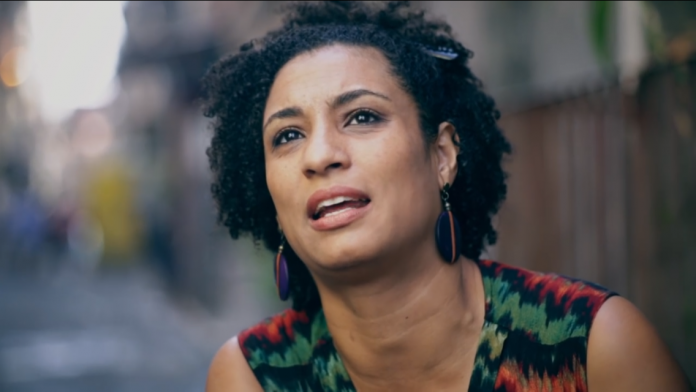The execution consisting of nine shots of Marielle Franco, a poor black female council woman born in a favela in Rio de Janeiro, caught the attention of international community. It exposed rampant violence in Brazil’s inner cities and how the Military Police uses force to contain civilians. Considered the only public voice of the favelas, the death of Franco, 38 years old and a strong human rights activist has shaken the political world in Brazil. With only a few months before the presidential elections begin in October, issues such as social inequality, democracy, equal rights and human rights are once again the focus of discussion. Brazil has lived for almost two years with what many call a “political coup d`etat”, when a democratically elected President was impeached from power for political reasons. As consequence, the political backdrop is of an extremely polarized nation, where hatred of those who has opposite ideas has fuelled political debate and divisions on social media.
Rio de Janeiro has not been the same since the economic crisis that first gripped the country in 2014. Violations of human rights, racism and the murder of civilians, mostly black and poor, slum dwellers, make up a sad portrait of a city that has long been considered one of the most beautiful in the world.
The violence in Brazil is increasing as a result of extreme social inequality and the ongoing economic crisis experienced in the country. According to official data from the Institute of Applied Economics (IPEA)- [1]the official statistical institute of the country, the number of homicides reached 60,000 people in 2017. From this, 71% of the victims are black.
Marielle Franco was an active politician. She was the voice of the population of the hills, where the main favelas of Rio de Janeiro are located. The lack of confidence in Governmental powers made Franco stand up as spokeswoman for the residents of poor communities where she was active, particularly in denouncing the brutality and crimes committed by the Police.
Just a few days before her death, she tweeted [2]about the military police abuses in the shantytown of Acari, which she said killed young men indiscriminately. In two posts in a week, Marielle wrote: [3] “Another murder of a young man who may be entering the MP’s (Military Police) account. Matthew Manu was leaving the church. How many more will have to die for this war to end?” and “What is happening now in Acari is absurd! And it’s been happening forever. The 41st MP Battalion is known as the Death Battalion. Enough hope for the population! No more killing our young men!”
In the House of Councillors, Franco had assigned the task to follow the federal intervention[4] in Rio de Janeiro. The military intervention, ran by the Brazilian Army, was decreed by the President Michel Temer, to curb violence that is widespread in the state. Against this operation, Franco questioned the Military actions, especially the disrespect with which the poor people were treated in the favelas.
The country has stopped to honour her achievements. Left-wing militants and human rights activists are turning their mourning into a motivation to gather forces. Demonstrations organized all over the country speak up about the importance of discussing the actions of the Police in the poor communities, human rights and the Military intervention in Rio de Janeiro.
More human rights activists dead
The brutal death of Marielle Franco, was not the only one in that period. According to Amnesty International’s report 2017/2018[5], Brazil ranks as one of the most dangerous countries in the world for those who work in Human Rights, followed by Colombia, the Philippines and Mexico.
“What happened is a frightening fact and is another example of the dangers that human rights defenders face in Brazil,” says Jurema Werneck, Executive Director of Amnesty International Brazil. She recalls the work of the council woman as a member of the Local Commission of Human Rights in Rio de Janeiro, especially in the defence of black and young women from the favelas.
For Werneck, the death of the council woman is a scary fact that cannot remain unpunished. “The state must protect the witnesses and survivors, identify the motive of the murder and bring the guilty party to justice,” he said.
In addition to Amnesty International, however, other institutions have submitted reports pointing to the disregard for the safety of political activists. Data from Global Witness[6] place Brazil as the world’s deadliest country when it comes to defending the land and the environment. Concerned about the preservation of forest areas, lawyers, journalists, indigenous leaders or representatives of non-Governmental organizations are among the high murder rates presented by Global Witness. In Brazil, 49 activists were murdered in 2016, followed by Colombia, the Philippines and India.
From now, the death of Marielle will be part of these statistics. For some activists, however, it will be another reason to fight for. More than one month after her murder, however, the crime is still unsolved.
[1] Cerqueira D. et al, ‘Atlas da Violencia’ (Instituto Economico de Pesquisas Aplicadas, June 2017) http://www.ipea.gov.br/atlasviolencia/download/2/2017 acessed 18 March 2018
[2] Marielle Franco, ‘Somos todos Acari, parem de nos matar’ (Twitter, 10 Mar 2018) https://twitter.com/mariellefranco/status/972587390131896320 acessed 17 March 2018
[3] Marielle Franco, ‘Mais um homicidio de um jovem’ (Twitter, 13 Mar 2018) https://twitter.com/mariellefranco/status/973568966403731456 acessed 17 March 2018
[4] Planalto, Senado aprova decreto de intervencao no Rio de Janeiro (20 Jan 2018) http://www2.planalto.gov.br/acompanhe-planalto/noticias/2018/02/senado-aprova-decreto-de-intervencao-federal-no-rio-de-janeiro/#acontent accessed 18 March 2018
[5] Amnesty International ‘ Report 2017/2018 – The State of the World’s Human Rights’ https://www.amnesty.org/download/Documents/POL1067002018ENGLISH.PDF
[6] Global Witness, ‘Defenders of the Earth – Global killings of the land and environmental defenders in 2016’ file:///C:/Users/s5001327/Downloads/Defenders_of_the_earth_report.pdf.pdf acessed 17 Mach 2018)
Patricia Britto







